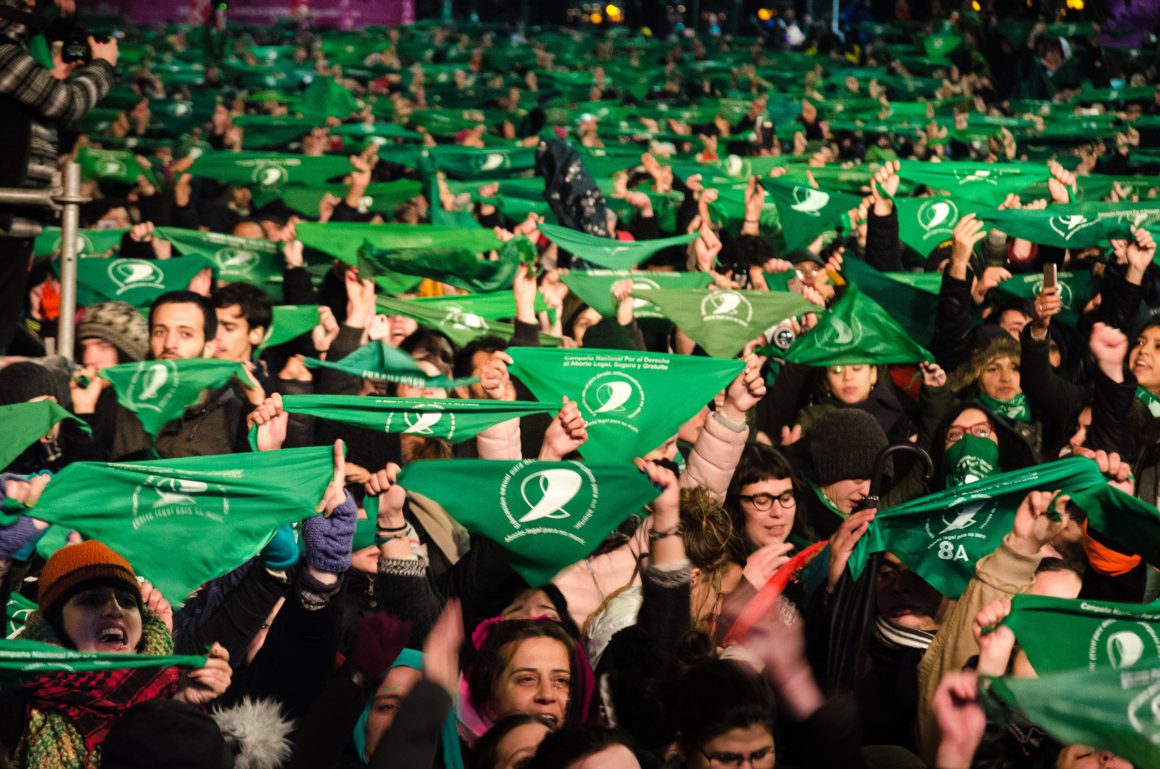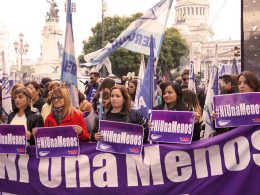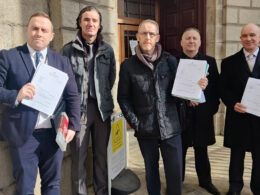By Isidora Duran Stewart , Rosa Socialist Feminist Movement organiser — article first published on rosainternational.org
“Legal abortion – so as not to die!” – is what is printed across the symbolic green scarves worn by inspiring feminist activists organising all over Latin America, where 3 in every 4 abortions are unsafe. A decades long fighting movement for abortion rights, the marea verde, or green wave, has triumphed in Uruguay, Argentina, Colombia and Chile, piling pressure onto governments to decriminalise, legalise and expand abortion access for women and people who can get pregnant. It has now achieved another victory – this time in Mexico. A huge step forward, and cause for celebration for activists everywhere, the sweeping decriminalisation of abortion is the result of millions mobilising across the country, their movement part of a broader feminist wave that has been gaining momentum internationally.
Advances and setbacks in our struggle
But the latest advance of the green wave stands in glaring contrast to the current situation in Mexico’s neighbouring countries. To the South, in Guatemala, abortion remains illegal except in cases where there is risk to life. As if playing a cruel and twisted joke, the conservative Viva Party chose last year’s International Women’s Day to move legislation to increase the penalty for abortion from 10 years to 25 years, almost unanimously passed by the right-wing controlled Congress. Yet, fearing a brewing feminist revolt from below, the anti-choice president reversed the decision days later. Let the recent victory in Mexico serve as a radical and hopeful impulse to the movement!
In the US, 15 months have now passed since the constitutional right to abortion was revoked. In the span of just over a year, 14 states have imposed a total ban on abortions, while several others have dramatically limited abortion access, only allowing it within the first six weeks of pregnancy, a time when most women will not even realise that they are pregnant. The dystopian post-Roe reality is that essential and life-saving healthcare is being denied outrightly to millions of people. It means that from state to state, abortion legality has flickered in and out, while conservative courts viciously battle women and pregnant people who dare to demand autonomy over their own bodies and lives.
The striking difference between the U.S and large swathes of Latin America is not incidental. Despite everything, despite the victorious abortion rights movements in Latin America, Ireland, and South Korea, despite the revolutionary Woman Life Freedom movement in Iran – a movement that crystallised around the issue of bodily autonomy – despite the millions strong protests for International Women’s Day in the Spanish state this year has been simultaneously defined by an encroaching, further emboldened far-right presence. Despite everything, abortion rights are still under attack.
Decriminalisation and free and accessible abortion integrated into public healthcare
But first, what is the significance of the green wave’s victory in Mexico? And what comes after decriminalisation?
Decriminalisation does not ensure dignified, safe and free access to legal termination of pregnancy. It must be accompanied by the allocation of resources and the expansion of health service coverage for the full exercise of this right. Otherwise, as has been the case until now, only wealthier women and pregnant people will be able to have abortions, while the rest will be forced to have abortions in poor conditions in the best of cases, or be forced to continue the pregnancy, which can result in death, in the worst of cases. For working class people, abortion care that is legal but inaccessible is a stone’s throw from that which is prohibited. A system for the rich means autonomy for the rich, and the rich only.
In the horrifying wake of Roe being overturned, women and pregnant people were left scrambling for ways to secure necessary abortions. With tens of millions living in states where it was immediately outlawed, working class people were faced with traveling hundreds of miles and missing several days of pay to have an abortion, that is, if they could afford to make the journey at all. Then, Republican politicians nonchalantly floated the idea of travel bans – the barring of a state resident from travelling to another state to secure an abortion – and a few weeks ago, this draconian measure became a cruel reality. Anti-choicers in Texas have now imposed a travel ban along interstates and around airports, blocking off exit routes so that pregnant people are trapped within the confines of their state and forced to continue with unwanted pregnancies.
This right-wing backlash has led to a steep rise in criminalising pregnant people in the US. Law enforcement has carried out nearly 1,400 arrests of people for allegedly endangering “unborn life” between 2006 and the fall of Roe v Wade in 2022. In total, there were more than 1,800 cases where either law enforcement or healthcare workers criminalised people for their pregnancies in the half-century between Roe’s emergence in 1973 and its end in 2022.
But it’s not just the US where pregnancy criminalisation is on the increase. In the UK, a woman was sentenced to two years in prison for having an abortion with pills after the legal limit. A mother of three and living with her ex-partner in the height of a covid lockdown, she was arrested for taking her healthcare into her own hands after the system failed her at every turn. In Poland, where abortion has been almost completely outlawed for decades, activist Justyna Wydrzynska was sentenced to eight months of community service for procuring abortion pills for a woman who was in an abusive relationship.
Misoprostol discovered by poor Black women in Brazil, and now denied to them by the state
Misoprostol, one of the two medicines (the other being mifeprostone) recommended to be used for abortions was ‘discovered’ by Brazilian women in favelas when it was being sold over the counter to treat stomach ulcers. By 1991, it became available by prescription only. Seven years later, the National Health Surveillance Agency (Anvisa) in Brazil, classified it as subject to special control. From then on, its use was restricted to hospitals and its purchase and sale were criminalised, with a penalty ranging from 10 to 15 years – higher than the penalty for rape. In Brazilian hospitals, it is necessary to register the ID and tax number of both the director and pharmacist with Anvisa, say whether the medication is being used to induce labor, abortion, or haemorrhage, and make a hospital record indicating the tax number for the patient and doctor, as well as the number of pills used. What was once a widely used, easily accessed medicine is now mystified, restricted and siloed from public view. Mifeprostone is even more difficult to access.
Today, abortions in underground clinics cost four times the minimum wage, and the medicines used are often counterfeit and variable in their efficacy and safety. Almost 1 million illegal abortions take place in Brazil each year, and 49,000 die as a result, with black and indigenous women disproportionally affected. In the last year, there was at least one lawsuit per day against a woman or person for having an abortion. This stands in stark contrast to the 552 legal abortions recorded for the last 8 years.
Vital moment for abortion movement in Brazil
In Brazil, Feministas AntiRacistas Socialistas, part of ROSA International Socialist Feminists – have been campaigning as part of a united front against the criminalisation of pregnant people and for the legalisation of abortion. Since 2017, the supreme court has been tiptoeing around the ADPF 442 – a legal recourse aims to decriminalise abortion up to the third month of pregnancy. Whether a hearing will be held seems to be resting on the decision of a supreme court minister, otherwise it will be postponed again until 2025. Women and people who can get pregnant can’t wait any longer! Without decriminalisation, there is no possibility for ending the ban on misoprostol, and as long as such harsh restrictions exist, women and people who can get pregnant will continue to suffer, die and be criminalised for having abortions. September 28 is the Latin American day of struggle for legal abortion and Feminists AS will be mobilising to demand the immediate approval of ADPF 442 as well as for the revival of the green wave to continue the struggle for free, safe and legal abortion in Brazil. If you’re in Sao Paulo – get involved!
The reality is, when millions of peoples lives are at risk, any improved access to abortion is a step up. Fighting for decriminalisation in countries such as Mexico and Brazil, is both grounded in the living struggle and conditions of these countries and optimistic about the potential for a united socialist feminist movement against patriarchal capitalism. Each and every grassroots victory reminds us of the power of collective struggle and clarifies the purpose of our movement to an even sharper degree. Do we want a free, public and secular healthcare system – yes! Do we want easily accessible medical abortions for everyone who needs them – also yes! Abortion pills in pharmacies and clinics now is not only a practical way to take control out of the hands of institutions that have historic bonds with the conservative establishment, it also helps to overcome stigmatization, and normalises abortion on request. But the fight will never end there.
Only in March of this year, the right-wing offensive on abortion rights in Texas intensified when a far-right, anti-choice coalition sought to challenge federal approval of Mifepristone. Because abortion pills are safe, easily accessible and require minimal assistance from medical professionals, they are a key tool to fight back against the right-wing assault on abortion rights. The nationwide ban would have left women and pregnant people with significantly reduced access to safe medical abortions by pills – in some cases limiting options to surgical abortion – even where abortion is entirely legal. Limiting access to misoprostol-only abortions would bring Texas closer in line with Brazil. In every U.S state, anti-choice politicians continue to introduce anti-choice legislation at a local level – awaiting an opening to repeal statewide protections. The constant threats to bodily autonomy endemic to the capitalist system mean that nothing is guaranteed, and everything is ours to fight for.
Capitalism’s care crisis, the religious right and the far-right threat
What an indictment. Even in countries where abortion is legal, women are being arrested or threatened to be criminalised for having them. And the far-right backlash has made abortion services even more vulnerable, with patients and workers being harassed and threatened, their funding cut and staff leaving or moving country for better working conditions, leaving many to close down altogether. The care crisis has reached a tipping point and the health system is unable to deliver the care that people need. After the 2018 victory in Ireland, 8 out of the 19 maternity hospitals in Ireland still don’t provide abortion access, because they are owned and often controlled by the Catholic Church. The capitalist class isn’t interested in or capable of addressing any of these systemic failures. Any person with that much power and influence can access healthcare at the drop of a hat. Their interests, as landlords, as CEOs, are in hoarding profit and maintaining their social position at the expense of the exploited and oppressed. They don’t care if people die. Some may call themselves feminists, but in reality, they cannot be relied upon to fight for real bodily autonomy or real change. The pressure of a mass movement may force them to agree with access to abortion by law, but they will never fight with us for real access. And while the far-right waxes poetic about opposing the establishment, as anti-choice, anti-worker transphobes, they are as close to establishment as one can get. Scratch an ‘anti-establishment’ reactionary and you’ll find a capitalist!
Abortion and trans rights — linked struggles for bodily autonomy
Another of their calling cards is their poisonous transphobia which has been used to drum up new levels of hatred against one of the most marginalised communities. This year, the far right and right populist parties around the world railed against ‘gender ideology’ and against the social recognition of the validity of trans identities and lives. Capitalism as a system relies on the oppression of women, a gendered division of labour, and the unpaid domestic labour mainly of women within the structure of the nuclear family. It therefore depends on an ideology of gender stereotypes and roles. The real gender ideology is the capitalist gender binary! Just by existing, trans people as well as other LGBTQ+ people undermine this ideology and therefore face oppression in capitalist society. It returns to the idea that people’s bodies are not their own, but instead must serve a purpose determined by the capitalist system. Any policing of our bodies highlights how much the struggle of trans people and women are linked – we are the first to be targeted by reactionary forces who try to force us to live our lives on their backwards terms, and we are the first to fight back. The right to choose is a trans issue and the breaking of the gender binary is a women’s issue – this is demonstrated in the international counter-protests against far-right transphobe Posie Parker, where hundreds of women and LGBTQ+ people have stood side by side against her vitriolic hatred.
Resisting the anti-feminist backlash
2023 also saw a rise in internet misogyny as part of the broader anti-feminist backlash. Violent misognyist Andrew Tate went viral earlier this year for spouting a highly individualistic and hierarchical view of society and human nature where wealth equals value, poor mental health equals weakness and male supremacy is natural. Spanish football manager Rubiales was forced to step down after he was filmed assaulting the women’s team, and Russel Brand, online peddler of far-right conspiracy theories in recent years, has been exposed as a vile and callous abuser.
Ni una menos, #metoo, #seacobo and the green wave have given women and LGBTQ+ people the tools to identify the roots of gender violence, medical misogyny and restrictions on bodily autonomy in the system. Black Lives Matter and other anti-racist and anti-imperialist struggles have made the idea of systemic racism a generally accepted truth amongst the vast majority of the working class and youth. Amongst the youthful base of these movements, there is a strong sense that all struggles against oppression are interconnected, and that to fight for the liberation of any oppressed group, we have to fight for the liberation of all.
Ten years of ROSA Socialist Feminist Movement
This year, ROSA in Ireland celebrated its 10-year anniversary. In 2013, ROSA cut its teeth in the throes of the abortion struggle in Ireland, in which it played a vital role in helping to win free, safe legal abortion, including up to 12 weeks on request with no restrictions. The first activists to ever take abortion pills in front of the eyes of the press, ROSA members organised an Abortion Pill Bus, garnering huge media attention and spreading awareness about the option of safe medical abortion to those who didn’t know about it – sending a message that the 8th Amendment would be defied and had to go. This action was ROSA’s contribution to politicise the use of abortion pills in a country where clandestine medical abortions were happening every single day.
Since then, ROSA has been established in many more countries and has been enriched on the streets in struggle around the world. It was clear that Repeal was not just about ending the abortion ban, it was about breaking the connection between church and state in Ireland and the influence of the Church over people’s personal lives. It was a verdict on the historic oppression of women which had been a key feature of the misogynistic Irish state. Combined with the vote on marriage equality three years before, it signalled the direction in which the majority wanted society to go – inclusive, equal and with freedom of choice. Today, the fight for bodily autonomy continues, taking aim at the dire state of trans healthcare in Ireland and calling for a total overhaul – to provide trans and non binary people with an informed consent and gp-led model of healthcare, instead of the waiting lists, pathologising and paternalism they now face.
For a world without fear
In the wake of all these struggles, over 200 socialist feminists from every habitable continent gathered in Vienna on 18 and 19 March of this year for the first-ever ROSA international conference. Activists from 20 different countries in person, and more on zoom, who are fighting against the deeply misogynistic capitalist system and the recent right-wing backlash came together to discuss how best to bring our struggle forward, more urgent now than ever before.
The green wave in Mexico fought and won full decriminalisation of abortion under all circumstances and the removal of any and all legal barriers to abortion access, but the struggle isn’t over yet. A radical mass movement led and sustained by the united working class in all of its variety, one capable of breaking with capitalism and the endless horrors this system engenders, is the only way to secure real access to abortion for all who need it, laying the basis for a world where women and people who want to have children are able to, without any economic, misogynistic or queer-phobic barriers, so that we can all live our lives to the fullest. Nina Simone once described freedom as ‘no fear’ – a socialist world would mean no t fear of homelessness, no fear of going without healthcare, and no fear that anyone will be making decisions about our bodies other than ourselves. From Latin America, to the Spanish state, to Iran, women and LGBTQ+ people are fighting back; their focus hardening on the culprit that Chilean feminists rightly identified in their revolutionary anthem: ‘The rapist is you! The police, the judges, the state!”
September 28 is the International Safe Abortion Day — join the socialist feminist struggle to fight for a world without fear.












